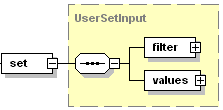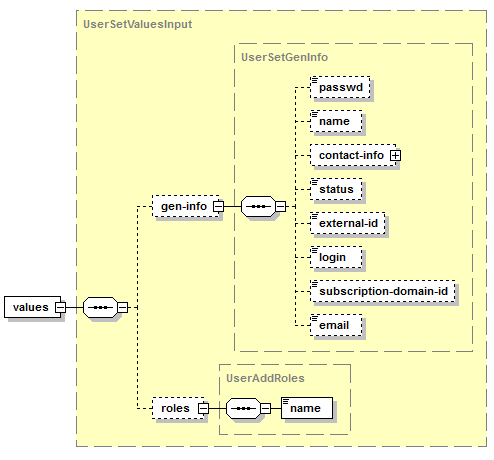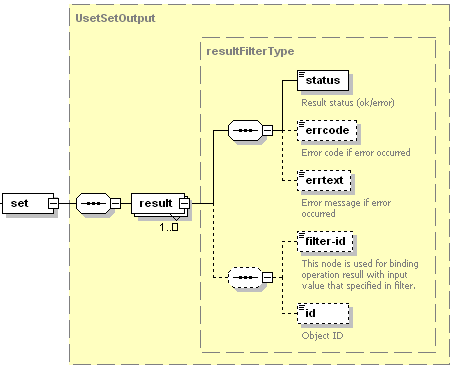Updating User Account Details
Use the set operation to update user account details.
Request Packet Structure
A request XML packet that changes user account settings should include the set operation node:
<packet>
<user>
<set>
...
</set>
</user>
</packet>
The set node is nested within type UserSetInput (user.xsd).
This node has the following graphics representation:

Note: The interactive schema navigator for all request packets is available here: http://plesk.github.io/api-schemas/1.6.8.0/agent_input.svg.
-
filter, required
It indicates users to be updated with the specified information. Data type: UserSelectionFilter (
user.xsd). To see the structure of this node, proceed to section Available Filters . -
values, required
It contains a collection of settings that will be set for the filtered user accounts. Data type: UserSetValuesInput (
user.xsd). See the definition of this node below.
The values node is structured as follows:

-
gen-info, optional
It specifies a collection of general settings that will be set for the filtered accounts. Data type: UserSetGenInfo (
user.xsd). -
passwd, required
It specifies the password of a user account. Data type: string.
-
name, required
It specifies a user name. Data type: string.
-
contact-info, optional
It specifies contact information for this user account. Data type: ContactInfoAdd (
user.xsd). To see the node definition, refer to section User Contact Information. -
status, optional
It specifies the account status. Data type: string. Allowed values:
0|1|enabled|disabledValue 0 is equal to disabled, 1 is equal to enabled.
-
external-id, optional
It specifies the ID of the user account in the Plesk components. Data type: string.
-
login, optional
It specifies an account username (can be an e-mail address or word containing alphanumeric, dash, dot and underscore symbols). Data type: string.
-
subscription-domain-id, optional
It specifies the subscription id to which the user will have access. If not specified or is set to 0, it grants the user access to all subscriptions within your hosting account. Data type: string.
-
email, optional
It specifies the email address of the user account. Data type: string.
-
roles, required
It specifies the user account role settings. Data type: UserAddRoles (
user.xsd). -
name, required
It specifies the name of a role assigned to the account. Data type: string.
Note: When creating request packets, put nodes and elements in the order they follow in the packet structure.
Response Packet Structure
The set node of the response packet is structured as follows:

Note: The interactive schema navigator for all response packets is available here: http://plesk.github.io/api-schemas/1.6.8.0/agent_output.svg.
-
result, required
It wraps the result of the requested operation. Data type: extension of resultType (
common.xsd). -
status, required
It returns the execution status of the operation. Data type: string. Allowed values: ok | error.
-
errcode, optional
Is used to return the error code when the operation fails. Data type: unsignedInt.
-
errtext, optional
It returns an error message if the operation fails. Data type: string.
-
filter-id, optional
It returns a filtering rule specified in the request packet. Data type: anySimple.
-
id, optional
It is required if the operation succeeds. Returns the unique identifier of a user account whose data is updated. Data type: integer.
Samples
A request packet can look as follows:
<packet version="1.6.3.0">
<user>
<set>
<filter>
<owner-guid>58bb9092-4c8b-4110-ba3d-c40bdad3b178</owner-guid>
</filter>
<values>
<roles>
<name>WebMaster</name>
</roles>
</values>
</set>
</user>
</packet>
Response:
<packet version="1.6.3.0">
<user>
<set>
<result>
<status>ok</status>
<filter-id>58bb9092-4c8b-4110-ba3d-c40bdad3b178</filter-id>
<id>20</id>
</result>
<result>
<status>ok</status>
<filter-id>58bb9092-4c8b-4110-ba3d-c40bdad3b178</filter-id>
<id>21</id>
</result>
</set>
</user>
</packet>